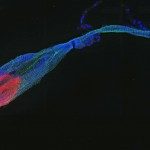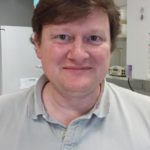Link to Pubmed [PMID] – 19284592
Malar. J. 2009;8:40
BACKGROUND: Reliable molecular typing tools are required for a better understanding of the molecular epidemiology of Plasmodium vivax. The genes msp3a and msp1_block5 are highly polymorphic and have been used as markers in many P. vivax population studies. These markers were used to assess the genetic diversity of P. vivax strains from French Guiana (South America) and to develop a molecular typing protocol.
METHODS: A total of 120 blood samples from 109 patients (including 10 patients suffered from more than one malaria episode, samples were collected during each episode) with P. vivax infection were genotyped. All samples were analysed by msp3a PCR-RFLP and msp1_b5 gene sequencing was performed on 57 samples. Genotyping protocol applied to distinguish between new infection or relapse from heterologus hypnozoites and treatment failure or relapse from homologus hypnozoites was based on analysing first msp3a by PCR-RFLP and secondly, only if the genotypes of the two samples are identical, on sequencing the msp1_b5 gene.
RESULTS: msp3a alleles of three sizes were amplified by PCR: types A, B and C. Eleven different genotypes were identified among the 109 samples analysed by msp3a PCR-RFLP. In 13.8% of cases, a mixed genotype infection was observed. The sequence of msp1_b5 gene revealed 22 unique genotypes and 12.3% of cases with mixed infection. In the 57 samples analysed by both methods, 45 genotypes were found and 21% were mixed. Among ten patients with two or three malaria episodes, the protocol allowed to identify five new infections or relapses from heterologous hypnozoites and six treatment failures of relapses from homologous hypnozoites.
CONCLUSION: The study showed a high diversity of msp3a and msp1_b5 genetic markers among P. vivax strains in French Guiana with a low polyclonal infection rate. These results indicated that the P. vivax genotyping protocol presented has a good discrimination power and can be used in clinical drug trials or epidemiological studies.

